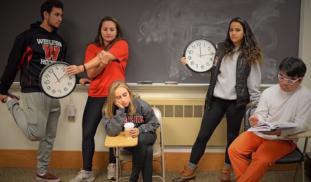Please wait...
About This Project
Higher levels of exercise have been linked to better sleep but it is unclear whether the time of day at which individuals exercise plays a role. This project examines whether the regularity and timing of exercise (early versus late), and circadian-type impact sleep. We examine these questions among athlete and non-athlete students to determine when (and for whom) does exercising lead to better sleep.

Browse Other Projects on Experiment
Related Projects
Do primate mothers grieve?
Do primates understand death? Can they grieve? When a primate baby dies, often the mother will carry its...
Does increasing enrichment complexity for bears encourage them to work harder for their food?
Food abundance, delivery schedules, and other external factors affect animal behavior in zoos, especially...
Cat and Human Personality Interaction Project
Millions of cats that enter US animal shelters every year are euthanized. Currently, there is little scientific...


